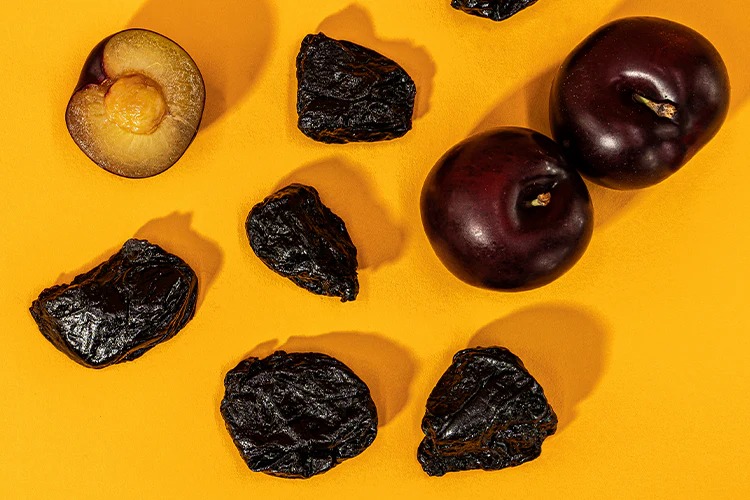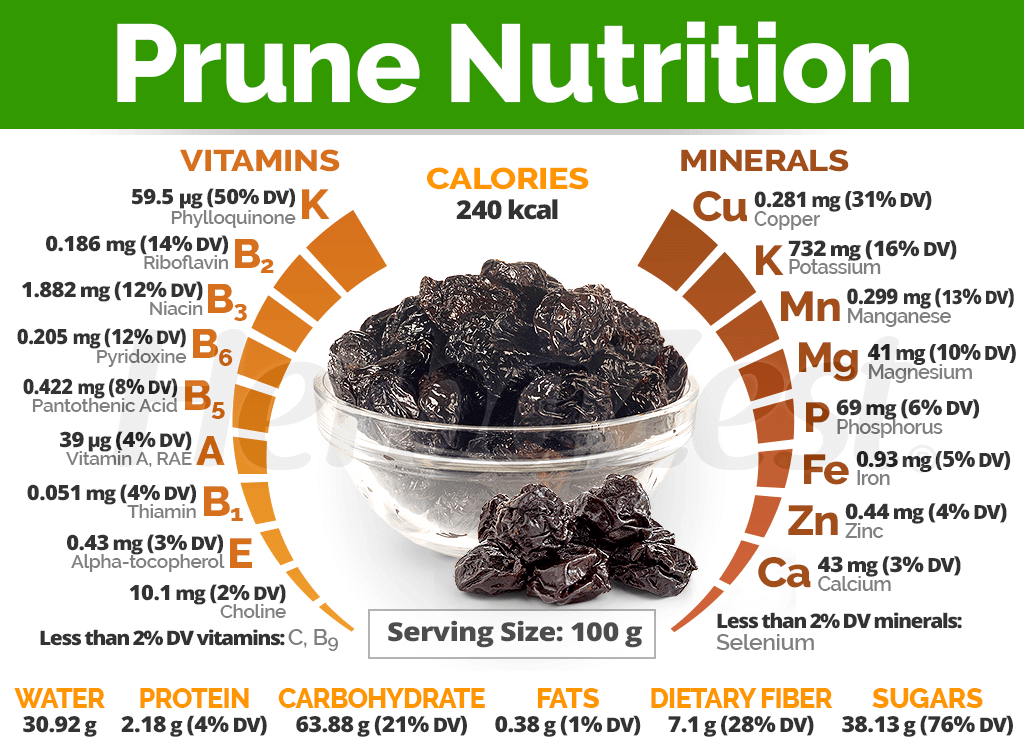Prunes may look simple—just dried plums with a wrinkled skin and dark color—but inside lies a powerhouse of nutrition that can revolutionize your health. These chewy little treats are not only naturally sweet and satisfying, but they’re also packed with fiber, antioxidants, and key nutrients that offer benefits from head to toe. If you’ve ever overlooked prunes as just a remedy for digestion, it’s time to take a closer look at why these dried fruits deserve a permanent place in your daily diet.
🌿 What Are Prunes Exactly?
Prunes are simply plums that have been dried to preserve their nutrients and extend their shelf life. While several types of plums exist, only specific varieties are chosen for drying, mainly the European plum (Prunus domestica). These plums are naturally high in sugar and don’t ferment quickly, making them ideal for drying without added preservatives. The result? A rich, chewy, sweet snack that’s incredibly nutritious and versatile.

🧠 Prunes and Brain Health: More Than Just Memory Boost
Prunes are loaded with polyphenols—natural plant compounds known to support cognitive health. These antioxidants combat oxidative stress in the brain, helping to slow age-related decline and improve memory. Studies suggest that regular consumption of prunes can reduce inflammation in the brain, which is linked to diseases like Alzheimer’s and Parkinson’s. If you’re looking for food that’s good for your mind as well as your body, prunes are a smart choice.
🦴 Bone Strength in Every Bite
One of the most amazing benefits of prunes is their powerful impact on bone health. Research shows that eating just 5–6 prunes a day can help prevent bone loss in postmenopausal women and improve overall bone density. Prunes are rich in vitamin K, boron, magnesium, and potassium—all crucial for maintaining strong, healthy bones. Unlike dairy, prunes offer bone-building benefits without the calories or lactose.
💪 Prunes for Digestion: Nature’s Gentle Laxative
This is the most well-known benefit of prunes—and it’s totally justified. With around 3 grams of dietary fiber per serving and a natural compound called sorbitol, prunes help promote smooth digestion and regular bowel movements. Sorbitol acts as a mild, natural laxative by drawing water into the colon. This makes prunes a gentle and effective solution for constipation, especially for children and older adults.
❤️ Heart Health: A Natural Cardiovascular Protector
Prunes are rich in antioxidants like phenolic compounds and vitamin C that reduce oxidative stress and inflammation—key contributors to heart disease. The fiber in prunes helps lower LDL (“bad”) cholesterol while supporting healthy blood pressure levels. Prunes are also a good source of potassium, which is vital for maintaining a steady heartbeat and preventing hypertension. One small daily serving can go a long way in protecting your cardiovascular system.
🧬 Antioxidant Power: Fighting Aging from the Inside Out
Prunes contain one of the highest antioxidant capacities of any dried fruit. These antioxidants, particularly polyphenols, neutralize free radicals that damage cells and accelerate aging. That means clearer skin, sharper vision, a stronger immune system, and reduced risk of chronic disease. Adding prunes to your daily diet is like giving your body a full-body shield against stress and aging.
🩸 Stabilizing Blood Sugar Naturally
Despite their sweetness, prunes have a low glycemic index. That means they don’t spike your blood sugar levels rapidly. Their fiber content slows digestion and helps keep insulin levels stable—great for people managing diabetes or prediabetes. Plus, the natural sweetness of prunes can help satisfy sugar cravings without turning to processed snacks.
🍽️ How and When to Eat Prunes
- Morning boost: Add 3–4 chopped prunes to your oatmeal, smoothie, or breakfast bowl.
- Mid-day snack: Enjoy a handful of prunes with nuts or seeds for sustained energy.
- Evening treat: A warm glass of milk with chopped prunes supports digestion and sleep.
- Cooking tip: Use pureed prunes in baking as a sugar substitute to make your recipes healthier.
Prunes are also excellent in savory dishes like tagines, rice pilafs, and chutneys. Their rich taste enhances flavor without overpowering the meal.
🤰 Pregnancy and Prunes
Prunes are a safe, natural remedy for pregnancy-related constipation. They also provide iron, a crucial mineral that supports increased blood volume during pregnancy. Regular consumption can help fight anemia and support healthy fetal development. Always speak with your doctor, but prunes are a natural and nourishing choice for most expecting mothers.

🌸 Top Benefits of Prunes During Pregnancy
- 🌿 Relieves Constipation Naturally
Prunes are high in dietary fiber and sorbitol, a natural sugar alcohol that helps soften stools—making them a gentle, natural remedy for common pregnancy constipation. - 🩸 Boosts Iron Levels
Prunes are a good source of iron, which is essential for maintaining healthy hemoglobin levels and preventing pregnancy-related anemia. - 💧 Supports Digestive Health
The fiber in prunes promotes a healthy gut, reduces bloating, and keeps your digestive system regular throughout pregnancy. - ❤️ Promotes Heart Health
Prunes are rich in potassium and antioxidants, which help maintain healthy blood pressure—a vital factor during pregnancy. - 🦴 Strengthens Bones for Mom & Baby
With nutrients like vitamin K, boron, and magnesium, prunes help support bone development in the baby and prevent bone loss in the mother. - 🍬 Helps Manage Blood Sugar
Despite their sweetness, prunes have a low glycemic index and help stabilize blood sugar levels, especially helpful for preventing gestational diabetes. - 🌙 Improves Sleep Quality
Prunes contain magnesium and vitamin B6, which support better sleep patterns—often disrupted during pregnancy. - 🌼 Supports Skin Health
The antioxidants and vitamin C in prunes promote healthy, glowing skin by fighting oxidative stress and improving collagen production. - 🍼 Provides Gentle Energy Boost
Natural sugars in prunes give you a quick energy lift without causing a sugar crash—perfect for fighting pregnancy fatigue. - 🛡️ Strengthens Immunity
Prunes help strengthen your immune system with their rich vitamin C and zinc content, protecting both mom and baby.
💡 Lesser-Known Benefits of Prunes
- Improves eye health: Thanks to vitamin A and carotenoids
- Reduces appetite: Fiber helps you feel full longer, aiding weight management
- Improves skin texture: Antioxidants reduce fine lines and support collagen
- Supports liver health: Detoxifies and promotes clean liver function
- Boosts immune system: Vitamin C and zinc offer immune-boosting power
🚫 Myths About Prunes: Cleared!
- Myth: Prunes are only for old people
Reality: They’re for everyone! Kids, adults, and athletes can benefit from their nutrition. - Myth: Prunes cause too much bloating
Reality: In moderate amounts, prunes promote healthy digestion without discomfort. - Myth: Prunes are just sugary dried fruit
Reality: Their fiber, vitamins, and antioxidants make them one of the healthiest dried fruits.
🌱 Choosing the Right Prunes
When buying prunes, look for unsweetened and preservative-free versions. Organic prunes without added sugar or sulfur dioxide are ideal. You can store them in an airtight container in a cool, dark place or refrigerate for longer freshness.

📝 Final Takeaway: The Superfood That Doesn’t Brag
Prunes don’t make headlines the way blueberries or kale do. But their quiet strength lies in their ability to support nearly every system in the body—without fanfare. Whether you’re battling digestion issues, concerned about bone loss, or just looking to eat smarter, prunes are a natural, delicious way to fortify your health. Add them to your daily routine, and your body will thank you in ways you didn’t expect.






